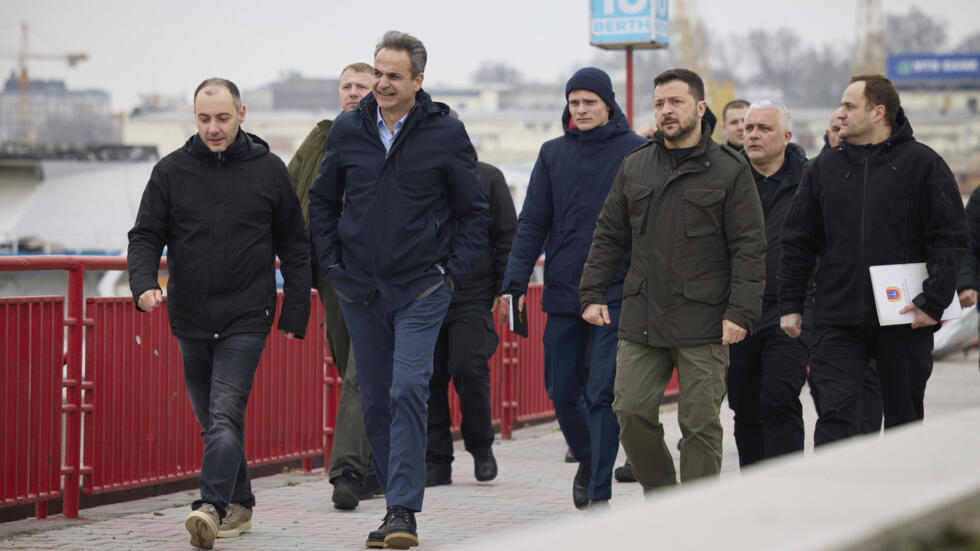Russian Missile Strike Near Zelensky And Mitsotakis' Convoy Shaking Odesa And Nearly Triggering NATO's Article 5
A Russian missile strike near Zelensky and Mitsotakis' convoy during a deadly attack on the Black Sea port city of Odesa. The strike, occurring just about 500 meters from the convoy, resulted in five casualties and numerous injuries, though miraculously, neither Zelensky nor Mitsotakis were harmed.
Author:Tyreece BauerReviewer:Elisa MuellerMar 07, 20248.2K Shares130.2K Views

In a chilling turn of events, a Russian missile strike near Zelenskyand Mitsotakis. The Russian missile exploded in close proximity to the convoy transporting Ukrainian President Volodymyr Zelensky and Greek Prime Minister Kyriakos Mitsotakis during a deadly attack on the Black Sea port city of Odesa.
The strike, occurring just about 500 meters from the convoy, resulted in five casualties and numerous injuries, though miraculously, neither Zelensky nor Mitsotakis were harmed.
According to a source familiar with the situation, the group felt the impact of the strike and witnessed a "mushroom cloud" of smoke, emphasizing the intensity of the attack. Dmytro Pletenchuk, a spokesperson for the Ukrainian Navy, confirmed the grim aftermath, stating, "Five people were killed in the strike, and more were wounded."
Zelensky, accustomed to high-risk visits to the front lines, expressed the gravity of the situation, stating, "We saw this strike today. You can see who we are dealing with; they don’t care where they strike."
He stressed the immediate need to bolster Ukraine's air defense capabilities, asserting, "The best way to do that is with an air defense system."
Mitsotakis, recounting the incident, highlighted the stark reality of the ongoing conflict in Odesa: "I think that for us is the best, most vivid reminder that there is a real war going on here. Every day there is a war, which not only affects the front, the soldiers, it affects our innocent fellow citizens."
Global Ramifications And Immediate Responses
The proximity of the strike to Mitsotakis, the leader of a NATO member state, amplifies concerns regarding the dangers associated with high-profile visits and the potential global repercussions of the conflict. Russia's Defense Ministry claimed responsibility for the strike, targeting a hangar in the industrial port district of Odesa.
Despite the gravity of the situation, the Russian Defense Ministry's statement did not mention Zelensky or Mitsotakis, only confirming the successful execution of the mission. The incident adds to the recent escalation of Russian strikes in the region, with a drone attack on an Odesa apartment block just days prior, resulting in 12 casualties.
Zelensky, reiterating the urgent need for international support, emphasized, "The world has enough air defense systems and the ability to produce weapons for defense. Weapons are needed here to save lives."
Urgent Pleas For International Support
The White House seized the opportunity to advocate for increased military assistance to Ukraine, leveraging the incident to pressure House Speaker Mike Johnson to bring up a vote on the stalled $60 billion aid request by US President Joe Biden. A National Security Council spokesperson asserted, "This strike is yet another reminder of how Russia is continuing to attack Ukraine recklessly every single day."
European Council President Charles Michel condemned the strike as "another sign of Russia’s cowardly tactics," calling for a collective international response. The incident underscores the fragile situation in the region, necessitating immediate attention and support to address the escalating conflict.
NATO's Article 5 Nearly Triggered
Former U.S. representative Adam Kinzinger raised alarms regarding the missile strike potentially triggering NATO's Article 5. Kinzinger expressed concern on social media, stating, "Russia just got within 150 meters of an article 5, with news of the strike in Odessa almost hitting the Greek Prime Minister." Article 5 of the NATO charter considers an attack on any member state as an attack on all, warranting a collective response.
The incident prompts discussions on the implications of NATO members being present in conflict zones and the possibility of triggering collective defense mechanisms.

Tyreece Bauer
Author
A trendsetter in the world of digital nomad living, Tyreece Bauer excels in Travel and Cybersecurity. He holds a Bachelor's degree in Computer Science from MIT (Massachusetts Institute of Technology) and is a certified Cybersecurity professional.
As a Digital Nomad, he combines his passion for exploring new destinations with his expertise in ensuring digital security on the go. Tyreece's background includes extensive experience in travel technology, data privacy, and risk management in the travel industry.
He is known for his innovative approach to securing digital systems and protecting sensitive information for travelers and travel companies alike. Tyreece's expertise in cybersecurity for mobile apps, IoT devices, and remote work environments makes him a trusted advisor in the digital nomad community.
Tyreece enjoys documenting his adventures, sharing insights on staying secure while traveling and contributing to the digital nomad lifestyle community.

Elisa Mueller
Reviewer
Elisa Mueller, a Kansas City native, grew up surrounded by the wonders of books and movies, inspired by her parents' passion for education and film.
She earned bachelor's degrees in English and Journalism from the University of Kansas before moving to New York City, where she spent a decade at Entertainment Weekly, visiting film sets worldwide.
With over 8 years in the entertainment industry, Elisa is a seasoned journalist and media analyst, holding a degree in Journalism from NYU. Her insightful critiques have been featured in prestigious publications, cementing her reputation for accuracy and depth.
Outside of work, she enjoys attending film festivals, painting, writing fiction, and studying numerology.
Latest Articles
Popular Articles